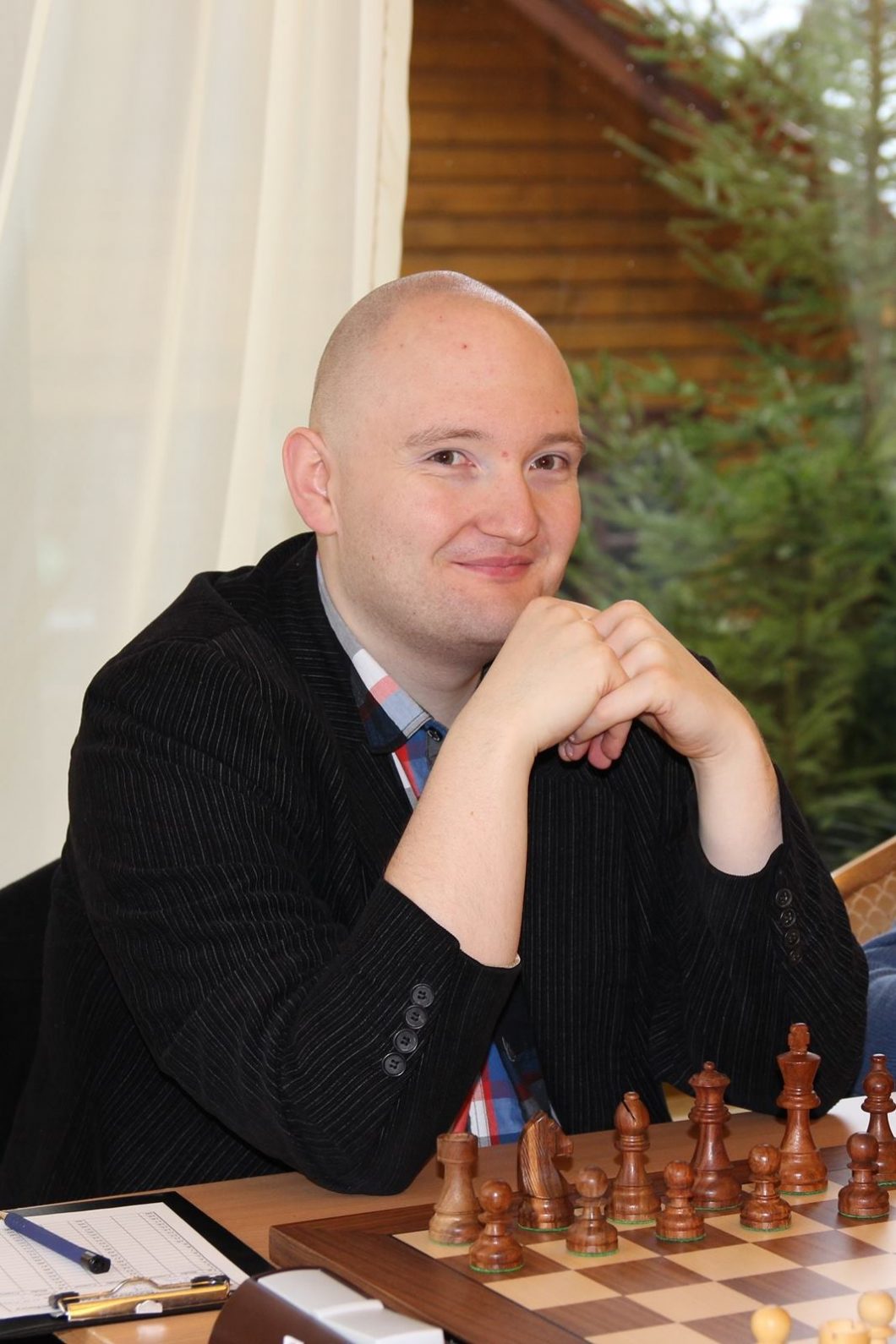In the last interview with the Polish Candidate Master “sensation“ Andrzej Krzywda, he mentioned he occasionally works with Polish Fide Master Kamil Plichta. He commended him as an opening specialist. He also referred to him as a „real killer“ of the lower-rated opponents – something most chessplayer struggle with. 1 When I googled his name, I also saw he is the author of the highly prolific Trompowsky course on the website Chessable.
I thought it would be interesting to interview him. Since he obtained his title relatively late in his life (he was rated a 2150 player in his early 20s and became FM „only“ when he was 24), I wanted to ask him about his chess path and his training methods. I was also curious how he manages to be so efficient against weaker opposition.
I primarily expected the interview to stick to chess. But already after the preliminary conversations regarding the interview, I realized it will exceed my expectations.
Because Kamil is not only an incredibly approachable, nice and pleasant guy. But he also has a fascinating life story. A story that includes moving away from his parents at the age of 20, never going to university, working as an online freelancer for 8 years, meeting his fiance on a chess tournament and pursuing a life-long dream of becoming a full-time chess coach.
We are excited, happy and honored to share his life story. Or at least a glimpse of it.
Hope you will enjoy it!
First Steps
Q: Hello Kamil, it is a pleasure to have you on Chessentials. Our custom here is to start the interview with the most generic question: When did you learn to play chess?
A: So I will also go with generic stuff – Hello! This is the first time that I give an interview that is longer than 10 sentences. In 1999 when I was 9, I and my family went on holiday to the city of Kołobrzeg (where I moved in 16 years later LOL). It was 10 days of sunbathing, walking and basically doing nothing.
Q: Can you tell us how that happened? Who was your first coach?
A: So one day of that holiday have decided that the Plichta family will stay indoors because of the heavy rain. I remember that was the only raining day through the whole 10-day visit. My Dad – Andrzej (not Krzywda this time) saw that there are some games on the shelf in the main hall of the place we stayed and he picked one of them. Fortunately, he didn’t choose 240 Disney puzzles or checkers, but a game of chess.
So he showed me the moves and I tried to remember how my pieces are moving (which I tend to forget to this day). You know the type of person that you show a new game to him and he immediately starts to play on some level – meaning that he gets the most basic concepts very quickly. So I was the opposite xD I can only tell that my first coach was a King made of Legos.
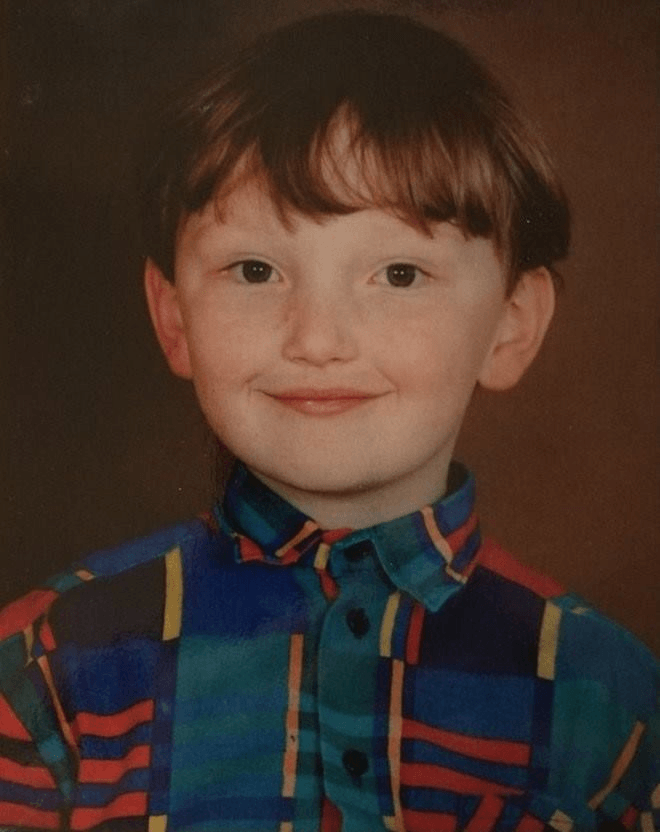
Q: When did you realize you have some talent for the game? When did you visit the chess club for the first time?
A: So I never considered myself as a talented chess player. Even few years ago when a colleague IM of mine realized how much time I spend on chess, he told me that I have to be “completely talentless”, because for him working on chess was not something important and he is an IM xD Basically when I came home from that holiday I didn’t touch chess, but on my next birthday I got a gift which was a computer game called “Lego Chess”.
From 20 years perspective I can tell that it is definitely in the TOP 5 gifts I have ever get – I can’t tell that it is the TOP 1, because my fiance can read that and may have a different opinion on that and I like to have a peaceful life – at least besides the chessboard. Up to when I was 12 that game was one of my favorites and from the time perspective I can say that I was improving, but not very rapidly.
Q: What about your first tournament? Do you remember your first tournament game?
A: When I was at school and we were about to play a football game, our teacher told us that a chess tournament will be held in our city. I immediately decided that I will go there and try my best.
There was one condition that for every 2 people coming to the tournament there had to be a chessboard and the clock. I knew that I can’t get a clock so I decided that I should buy a decent chess set. Unfortunately, I never heard about Staunton and the Donald Duck’s set I had at home wouldn’t probably work on the tournament so I spent the whole day looking for the best possible chess set that I could find. So I spent all of my money to get chess pieces, that were so light, that even wind could blow them off the board. But I have a great sentiment to them because they served me for the next 3 years. Of course, we didn’t play on my chess set during the tournament, because there were much more decent ones.
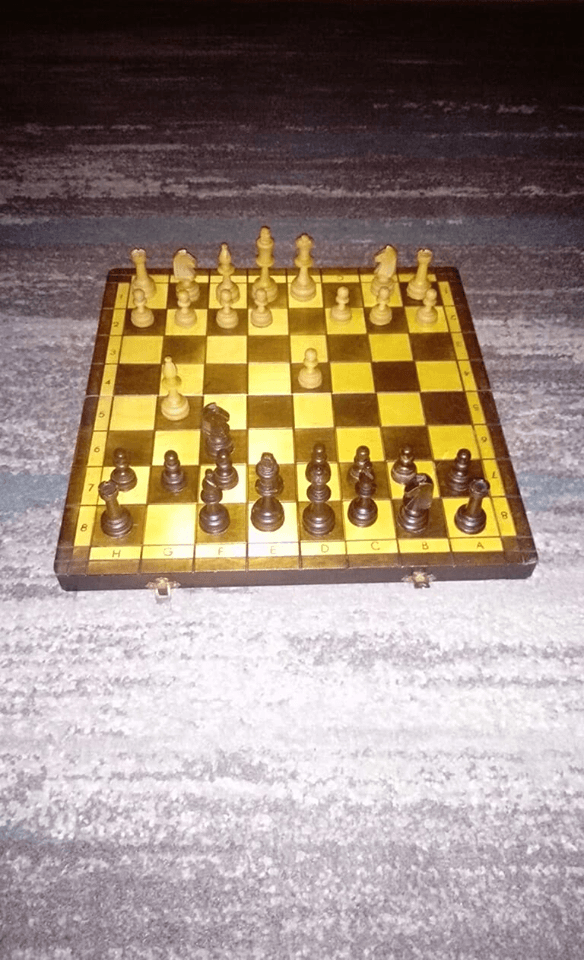
So it was 7.09.2002 8:45 and the tournament was going to start at 9:30.I grabbed my bike and rode around 3 kilometers to the other part of my city. And there was the first struggle – I am at the right place, but all the doors are locked. No cellphone, no GPS, but with a strong will to play I decided that if I have to get into the playing hall I will even climb on the roof and slide through the chimney. Fortunately, I saw two older gentlemen carrying a chessboard and I decided to follow them. So the first step to becoming a chess player was completed.
It was a 7×20 Swiss tournament and I remember I got 1.5 points which I got from two players of my level. I didn’t enjoy that beating very much, but when the tournament was over, an amazing thing happened. Because there weren’t many young players, every one of us got a diploma. So you can imagine a 12 years old kid riding his bike with only one hand on it, while on the other hand there was a precious diploma. If Gollum would approach me that day with his “my precioussss” stuff he wouldn’t get any chance. I could die hit by a car that day, but at least the driver would know that he just killed a 2nd best chess junior in Siedlce.
Q: What kind of a child were you? Did you throw pieces and temper tantrums? Or did you smile when you lost because „it is all just a game anyway?
A: I was a kind of kid that when you see outside 20 meters in front of you with a football and you decide to turn around and go the other direction, there is a big chance that I will be there too. However I never really threw pieces. I used to kick my computer when these stupid Paladins killed my Death Knight Level 6 in Warcraft II, but chess was probably the only game that really calmed me down. Let me tell that after that tournament I realized that there are chess meetings from 16:00 to 19-20 once a week, but no coach stuff, no strategy discussions, no books, just some people meeting and playing chess.
Of course, I went there, but soon I realized that the level of all the players there is just much higher than mine. That was not the problem for me, because I always had that spirit, that I will play 100 games to win this only one and it will be enough. The problem was that when people saw that my level is not too high, they didn’t want to play much against me, but there was always like someone has a cigarette break, he went to the toilet so instead of waiting, they played against me.
And I never had enough. It took me a few months to finally win a game. So basically you can imagine going there for a consecutive 9-10 weeks and losing every game – that’s a lot of beating. However, I felt that from every game I am learning something. I tried to look at how the best players there are playing and somehow copy them.
Teenage Years and Early Adulthood
Q: In contrast to many master-level players, your path was a bit curious. You were nowhere near the ‘prodigy’ status. At the age of 16, you were rated ‘only’ around 2000.
Do you have an explanation why you didn’t show potential you were to show later in your early years? Was it a matter of lack of work, lack of interest, simply bad luck, or something else?
A: Actually “from the first tournament to the 2031 FIDE” took me less than 4 years. Of course that level then was like 1700 now, but still, I wouldn’t consider that to be too bad. I fell in love with chess when I started learning some basic concepts. I remember buying my first book for 4 PLN (less than 1 euro now). The book’s condition wasn’t the best, but what was inside was the most important for me. It was some opening’s book written by GM Robert Hubner, where he introduced all of the openings.
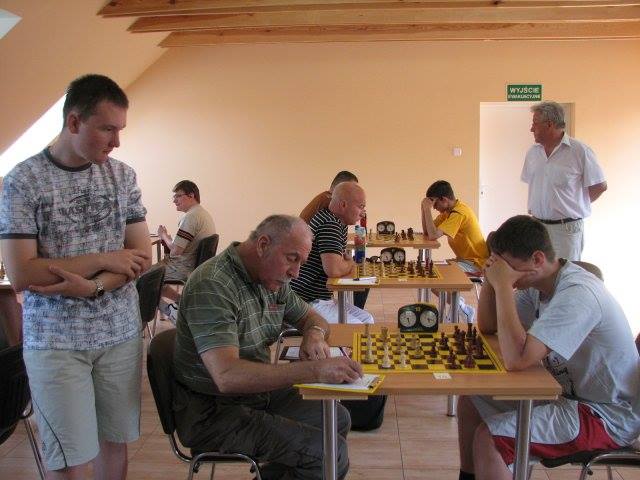
No comments to the lines, just moves and numbers. But it was enough. So then when I started with 1.b4 I knew it is named “The Sokolsky” or that in 4 Knight Game after 4.Bc4 I can play 4…Nxe4! So these 4 years were pretty intense to me. I remember in 2004 I and my class went to the 1-day trip to Warsaw and we had 2 hours of free time in the Shopping Centre. There was an “EMPIK” book store and I saw that there is a “hobby” part of that.
You can imagine a kid carrying 50 PLN with him and seeing that every book is 30 or 35 + of course Happy Meal has to be done too. So I made the best choice possible – Eduard Gufeld’s “King’s Indian Defence” You can imagine 2 hours trip back home in a bus, very bad light inside, but I still try to read the first game, the Gufeld’s immortal “Gioconda” against Bagirov:
You can only imagine how impressive that was to the boy, whose strength was around 1200 FIDE back then and who didn’t have anyone to take that kind of knowledge from. I fell in love with that book. The KID (not me but King’s Indian Defence) became my main weapon and serves me well to this day for almost than 15 years. Nowadays I don’t play too many lines from that book, but my love for the attacking and dynamic style is still here.
Later I got the Chessmaster 9000 and there we go – I spent a lot of time there. Also, some of the juniors in my town were improving so there was a small rivalry going. I was the only one from the School nr 3 and most of them were from the School nr 6 so you can imagine that hmm, they did sympathize with each other “a little” more than with me xD
But I never cared about that, because I knew that I am at least one level above them so my moves very often did make a talking for me. Fortunately for me, the principal of my school was a big chess fan. Himself he never played very strong, but he loved the game. So when I finished school, there were 3 kids who got a reward for “extraordinary achievements” and I was one of them – completely surprised.
Still not as surprised as my leading pedagogue, who was teaching us Polish language and threatened me that she won’t let me finish school with my behavior. There was the 1-6 scale of behavior and finally I got a 3 mark, so considering that I was a little brat at school wasn’t that bad. The fun fact is that these “extraordinary achievement” stuff automatically gave you 6 so she couldn’t stand that.
Q: In general, I have noticed there are several types of young players:
- prodigies who fulfill their potential and become professionals
- prodigies who reach master level but have trouble to make a step further
- non-prodigies who blossom later in life and become strong club/master level players
- non-prodigies who don’t make rapid progress much later in life
I have noticed the last group is most likely to give up playing chess completely. That’s why I wanted to ask you: What was your outlook on chess? What kept you going? What motivated you to ultimately become a member of the third group and become a sort of „late bloomer?“
A: Just love for the game. When I played chess I never treated that as wooden pieces and the chessboard. There was something more, something intriguing what I failed to find in anything else. The other thing is that people who were beating me in the beginning step by step started having bigger problems. I liked that. There was something in me back then that liked to be problematic.
Some kind of a small creature that always whispered to me to spoil something. Normally, the effects of that could be seen at school, but it started moving to chess. So instead of creating problems for my teachers and parents, I started creating problems for my opponents.
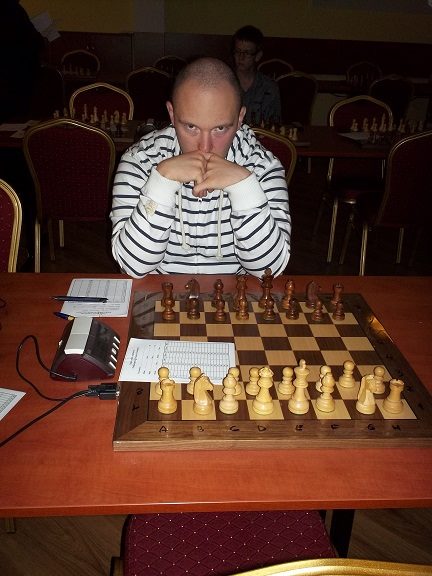
Q: By your own admission – at the age of 17, you got your first job when you saw a job ad in online chess forum. This guy was searching for someone who would transcribe positions given as pictures in the .JPG format into .PGN format.
Was this the ‘aha’ moment when you figured you don’t need to become a Grandmaster to earn money as a chess player? How much did this job influence your subsequent path?
A: I saw that a guy offers to pay around 200 PLN for 600 games. I knew that I am pretty “fluent in Fritz language” so I knew that it is for me. So I could watch games of amazing players and get money for that. 17 years old kid earning money from chess? It sounded unreal for me and I repeated that deal a few times. Still, it never was an aha moment for me that I can ever make a living off that. I never had any illusions that I will ever be a professional chess player.
Maybe if I would keep going with the spirit I had between 12-16 years old it would be possible that I would be a GM now, but as I said I never treated chess as something that can make me a living. Even nowadays I don’t have illusions that chess will be my main job or main income in the next 1-2 years. Maybe after 5 years from now, it will be possible, but it will never be a “pro player”. My bigger goal is to teach all of the chess players how to play an opening properly and if I can get decent money for that, then I can retire from everything else.
Q: To an extent, I hinted at what happened next in my last question. At the age of 18/19, you will not follow „The Plan“ and go to university.
Can you elaborate a bit on what led to that decision? Did you already have an alternative income source? Or did you just decide it is not for you?
A: So basically a lot of things influenced my decision. I tried hard, but didn’t find any possible university path for me. I was always a very good student so it wouldn’t be too hard to get into one, but I never thought that there is a point for me in doing so. I don’t mean by that that people who did it made a bad decision and for some people, it might have been the best shot. But I also think that there is a group of people who just don’t belong to the university and I felt like the leader of that group xD.
On one of the chess tournaments, I saw that some players are playing Texas Hold’em Poker and I joined them. I knew the rules and played a little bit of that online on virtual money. I watched the Maverick movie with Mel Gibson when I was quite young so I know how 5 Card Draw is working, but the Texas Hold’em I firstly saw on Eurosport when there were some poker events with commentary. Stakes weren’t too big and I decided to give it a try.
I heard that some chess players are earning money playing cards, but I always considered that as gambling and I knew that it is only going to be a fun evening with my friends and nothing more. And exactly that happened – we played a little and I forgot about that. And then, a few months later I heard about Poker strategy school. They offered 50$ for free, which of course is never free because they get some of your personal details + they get some % from the rake (a fee that you pay for every tournament/hand that you are involved in).
I decided that I can give it a try, but if I lose that 50$ I will quit. I was a little surprised that I will have better start than in chess, as here before you would be able to play you had to choose a format that you want to play and read some articles about that + complete few Quizzes which confirmed that you have essential knowledge.
And in 2009 it started. I was not a good or decent player back then, but I was good enough to slightly increase my account balance. One thing that I remember back then is that I had the same attitude as in chess, that when something was going downhill, then I could sit for hours until I got back to +. So you can compare that to the 4 months beating I was getting in chess when I started.
Still, I didn’t know if this is what I want to dedicate for in the next few years. But I always had that mindset that I prefer to regret things I did than those that I didn’t have the courage to implement. Sometimes, of course, that attitude backfired, but most of the time I am happy with my life decisions.
Q: How did you deal with all the worry and fear?
A: There was never worry or fear. You know, you are 19 years old and you earn better money than the average salary in your country. What else you need from life? I gave myself a year. Don’t get me wrong.
I went to the university to see if my assumptions are correct and when I needed to know the names of all of the human’s bones to pass then I decided to leave the building and never come back. So I went home and during the family meal I tore the Student’s ID card and my parents, of course, saw that.
Q: You told me your parents weren’t particularly thrilled with that decision. How did they react? What did they say?
A: I knew they will not accept my decision, but I even didn’t have illusions that their decisions will be different. 2-3 years ago I was one of the best students in everything and now I decided to dedicate at least 365 days to play that stupid card game. In my country, there were a few movies in the 70s and 80s where there are houses, cars, watches and family’s fortunes lost. That kind of beliefs are very “popular” to this day – people just can’t understand the fact that you can beat the game where you don’t have any impact on what cards you will get.
But the fact that you can play them with a ton of different ways to beat and crush your opponent is not obvious to most people and my parents back then were two of them. So basically they gave me 6 months to go back to university, go to work or I have to leave. That meant that I have 6 months to gain some money before I will go on my own.
Don’t get me wrong – my parents would always welcome me back, even if I would decide that I want to play poker. They are that kind of people that they will tell you what they have to tell, but deep there I knew that I always have that home that I can go back.
So I never had that fear that I will have to live under the bridge or something like that. I knew that in the worst case scenario I will lose 1 year of my life. Also because I never deposited my own money to play, I had that comfort that I never lost anything.
From the 10 years perspective, I can say that my parent’s decision was a good one because they gave me some time and I could prepare myself, but I needed to take big responsibility for myself.
Q: You told me you moved, nay, RAN, away from your parents when you were 20. How much was your getaway affected with the decision not to go to college? Did you move away because you felt you need more space and independence? Or because there was a lot of friction between you and your parents at a time?
A: So in the middle of September 2010 I rented an apartment in Warsaw and decided to live there. To that day I remember the moment when I locked the door and just lied down the bed and was staring for the next 30 minutes into the ceiling. That was one of the best moments of my life. I can imagine what Andy Dufresne felt after escaping from Shawshank – and I absolutely don’t mean that in any bad way about my parents – that was the first moment when I felt that I am 100% (ok 99%) responsible for myself.
Whatever I do now will affect my future much more than before. That moment when you realize that no one can tell you what to do was amazing.
Q: How tough was that period for you? Were you afraid? Anxious? Excited? Can you describe a bit what was going through your head back in the day?
A: At first very happy, but the problem was that now when I have a job, there was much less time that I can spend on chess. I was still improving as in 2010 I was rated around 2150, but my passion for the game was a little hit by a necessity to work. I never treated poker with the same passion I have to chess. I like what I do, but I treat that more as a day job not as something that I will do to the end of my life.
Chess is something that I will never abandon, while I don’t have any issues with not playing cards for a month or so. Also sometimes I get questions if I am not addicted. It would be much easier if I would, then I wouldn’t have to push myself to work when I should instead of doing another “Puzzle Rush” stream.
Road to FM
Q: But okay, you were able to make for a living through poker.
How did chess fit in the picture? You still kept playing a couple of tournaments per year. What made you stick to chess? What kept you motivated?
A: So my motivation for the game was described a few times in a fact that I just love the game. Also, I fell in love with openings, but I don’t think 2010-2011 was a period when it started. I always had a big fondness for Internet Blitz and Bullet. I felt like playing on the Internet keeps my game in a good condition. I know that may sound strange, but I never studied chess in a way that most people imagine that training should look like.
My chess training was 70-80% playing and by playing I was improving. It means that I analyzed these games to some extent (“only idiots analyze blitz games – Mikhail Botvinnik” – here you got me) and tried to find as many mistakes as possible. I worked with chess engines and I remember that my first serious opening work was the Traxler Counterattack.
It was back in 2007 when I sometimes analyzed some lines. I and my friends spent a lot of time on 1.d4 f5 2.g4 which I play to this day. In 2008 I kind of invented the line 1.d4 Nf6 2.g4!!? which has brought me many nice scalps in faster time controls. So as you can see, everything was based on the sharp lines. When I started earning some money I realized that it opened me a lot of new options. I started buying decent chess books, especially from QualityChess and Everyman.
That meant that I need to only check lines from books if they work or not, but I don’t have to create them on my own. I believed that much stronger players know what they are writing about and I decided that 2150 is that level, that when one achieves, he should know a thing or two about positional chess. So I decided that some endgame book + middlegame guide is needed. I am a big fan of learning chess from books.
When you have never had a coach you need to substitute him in that way or another. For me, chess programs for openings and books for everything else was always a way to go.
Q: For some time, you didn’t make any real progress. 2 How much did you work on chess back then? How much did your life situation affect your play?
A: That’s the funny thing about charts – they never show the truth! Note that in the last 4 years I gained 27 points ( 2320 X.2014 / 2347 II/2019), but it doesn’t tell the whole story. I feel like I am a few times better player now and I was steadily getting my rating up to 2400 ( I/2018), but when you reach 2400 your K changes to 10. So I had the last tournament on K=20 and I lost 67 points xD So basically now I need to earn twice that amount to get back to 2400.
Going back to 2010-2013 I knew that I am improving, and that classical rating is not telling the whole story. I never paid attention to my classical rating. I knew that whenever I will play good chess, sooner or later it will increase and I have that attitude today. I am not going to play tournaments to get norms.
For me, a tournament was always either more connected with going there with my family or purely to play chess – never to get a norm. Maybe if my attitude would be different my title would be different too, but I prefer to be a decent FM than not so great IM.
Q: It all changed toward the end of 2013. From August 2013 to October 2014, you made a rapid leap and increased your rating from 2199 to 2320. Can you describe your experience during that period? Could you talk a bit about the tournaments you played in?
A: I didn’t do anything extraordinary. I feel like my work finally decided to be granted with ELO points. So from my perspective, nothing happened. Usually, I was playing in the 2nd Polish league back then, the tournament in the city I was living back then – Poznan, one of my favorite tournaments which is a Najdorf Memorial in Warsaw.
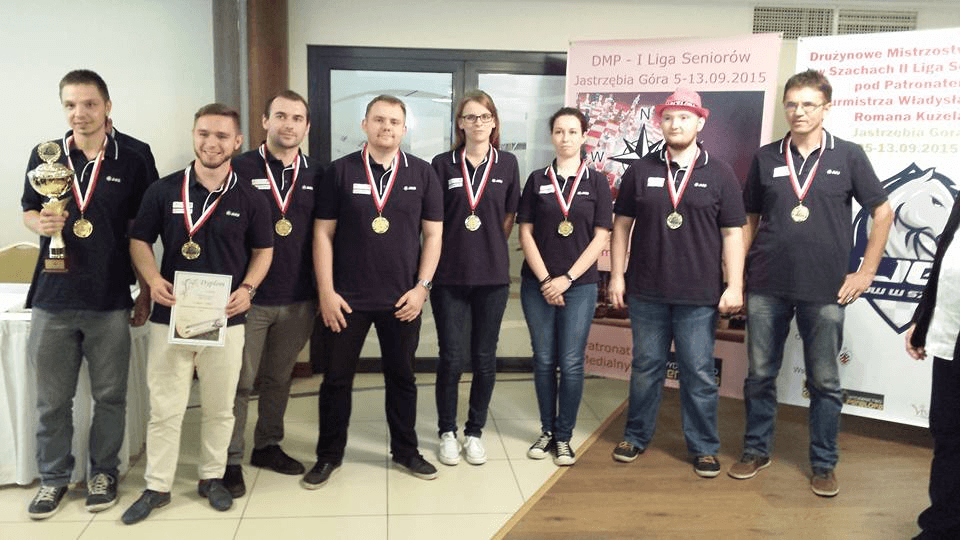
You can see some moments in my rating chart that there is a break-even period and then something strange is happening and I gain like 100 points. I have no reasonable explanation for that.
Q: What caused such a major breakthrough? What did your chess training routine consist of?
A: I never had any routine in training. I always do what I want to do at that specific moment. So still a lot of blitz and books.
Q: Was it merely the consequence of the number of hours, or were you also doing something differently than in the past?
A: Definitely the number of hours, but I wouldn’t call myself as somebody who works very hard about chess. Maybe because I treat chess as a hobby and passion I don’t treat that as a job. So I improve by doing what I love to do. You probably would never see me sitting at the chessboard with a book and looking at some games. I use chessboard to play. I know that it is not what most of the coaches recommend (me included xD) but for me, it is just working. I read books, but don’t work with them. That forces me to read some books a few times, but I like that. I like to read chess books, so I don’t have problems with that.
And because I don’t have any routine and any specific plan I never feel bored with chess. Sometimes I feel every negative feeling about that game, but I don’t think I was ever bored with chess.
Q: Were there others who helped you? Andrzej mentioned you are mostly self-taught. Was there a period where you worked with some sort of trainer?
A: No, never. I mean there were like single group lessons, but never seriously.
Q: In one of his streams, American International Master David Levy mentioned he really broke through the master level once he started „farming“ us 2000s and 2100s. You are also known as the „killer of the Candidate Masters“,
Q: How do you approach games against lower rated opponents? What enables you to be so effective against them? How do you avoid underestimating them?
A: Between 2015 and 2016 I radically changed my approach to chess. I learned to play a dynamic style, but not involving playing sharp lines. I started employing the King’s Indian Attack with White and English/Reti setups which allow games with a lot of pieces on the board, but hardly anyone can prepare against you. Because I was playing King’s Indian Defence my whole life I didn’t have problems employing the same position with reversed colors. With some openings, it didn’t work for me, but KIA was like the 2nd home. So My Plan A against lower rated players for the last 3 years was to go for that opening.
The second thing that I started paying attention to and got me really passionate about was so called psychology in chess. I don’t know why did it pay my attention so much, but I can guess that it was connected to poker, where all of your decisions are based mostly not on the table situation, but on the person who sits on the other side of the table. Knowing how many important mental weaknesses I had to combat playing both chess and poker I knew that most of my opponents have at least a few of these issues. For example feeling of injustice – we went all in, I had QQ, my opponent JJ, I was 81% favorite, but still lost a hand. And now make that 5 times in a row.
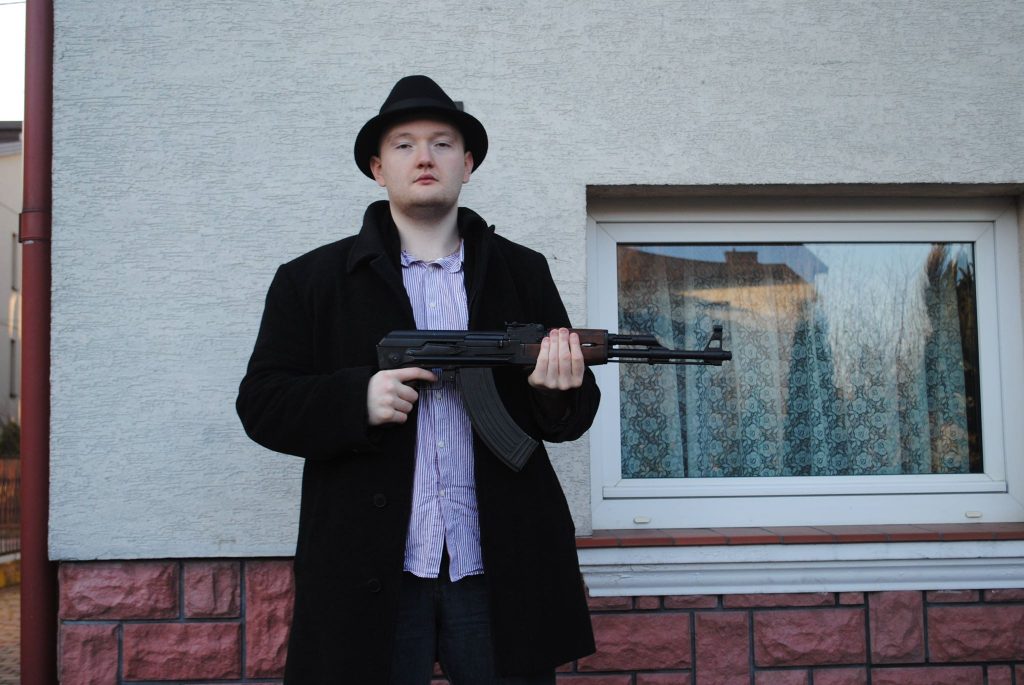
So I play chess, I am winning, and my opponent beats me with the last trick. Injustice? Another one – revenge. Bad player took my money so I will do everything to take that back. Weaker player beat you playing bad gambit and now you want to play like a monkey to get your point back because your ego boost is needed. These are just examples. In chess one of the most popular is the risk of losing. The other one is constant time trouble. I can go on and on. When I know my pairings the first thing I do is not to look at my opponent’s openings, but try to identify his style with the greatest amount of details. Everything can help.
Once I was playing the tournament where I got information that my opponent (an IM) normally works 8.00-16.00 and then he comes to play the game at 17.00. That information finally convinced me to play a gambit line in an important game and I beat him because he simply blundered the pawn. Think about that for a second: What type of positions/situations/openings you hate the most to have on the board and now imagine that you have someone who always strives for that against you. I try to be this kind of player myself. Now add to that that your opponent is 200-300 points higher rated than you and you can imagine the situations that you are talking about.
Of course, sometimes it backfires, but most of the time I manage to find weaknesses in my opponent’s play/repertoire/head and exploit them. I am always fair besides chessboard, but when I sit to play the game my best friend becomes my greatest enemy. Also, I will add that I try never to lose faith and sometimes squeeze positions that in books are called “dead draws”.
Oh and the last thing that may be important. From 2006 to today there were three classical games where I was in time trouble (under 1 minute). Most of them I end having over 20-30 minutes on the clock. That time management lets you control the situation, especially between moves 30-40 when you can decide what type of position you want to strive for according to the tournament situation and type of opponent that you have.
That attitude means that you need to play more intuitive chess and trust yourself really hard, but that is the style that I created for myself. I prefer to miss something tactical in 1-2 game out of 20 than to have time trouble in 10 out of 20 as it is much more possible that I will blunder in 3-4 of them
Q: On your Lichess coach page, you mentioned you also have more than 40 over-the-board wins against Grandmasters. From a psychological point of view – how is playing a 2500 player different than playing a 2100 player. Do you think you play your best against such opposition? Or are you the follower of the Fischer’s „I don’t believe in psychology. I believe in good moves!“ philosophy?
A: Yes, I definitely play my best against players rated 150-300 points higher than me. The reason is that I feel that by playing best I am able to beat them, while against 2650+ players it is much harder. That’s funny because the first post on my Polish chess fan page was about the fact that I completely don’t agree with Fischer as I described above. A few years ago I had some psychological weaknesses in my game. I decided to try to do everything for that not to repeat. For example, I was on 7.5/8 in Polish Blitz Championship 2015 and then I lost 6 in a row. It was one of the hardest hits I ever got from chess, but also one of the best things that could happen.
The number of conclusions I got was tremendous and I started working on that. I started to be more resilient when things weren’t going bad in online chess. Back then when I lost 2 games in a row I simply swore and quit. And that was the reason – I had problems with running bad. So since then, I know that these kind of situations were the biggest lessons for me. It is not an at to win when even heavens keep fingers crossed for you. The biggest strength and confidence boost is when you lay down in the dirt and you slowly rise back to the standing position. Going back to the question. I feel like I play my best against 2400-2650, while against 2000-2150 players I don’t play my best, but I play better than my opponents, and that is the key of winning games like that.
Life as FM
Q: Anyway, you became a Fide Master and managed to obtain those two letters in front of your name. What did the title of FM mean to you?3 Were you ecstatic once you reached it? Or was it followed by the feeling of emptiness and „What now“ moment?
A: Not so much ecstatic. I will be more ecstatic when I will get a GM title (laugh). It was a nice reward for all the work that I have done, but no more than that. Very rarely you don’t pay an entry fee to the tournament, so through these 4 years I can say that maybe these 100$ I paid to get the title did pay back in some privileges, but that’s all. One bonus may be that when you play abroad you have these two letters in front of your name.
Q: Were your parents proud? Did they retract their previous opinion about how not going to the college they saw you are paying your bills and achieving success? Or did they still think you should have „gotten a real job?“.
A: I think they were happy, but I never tried to tell them how important this milestone is. They were more proud of some individual results or some specific games, but the title I think is not in the TOP 10 proudest parents – baldsonFMmoments.
Q: It is well known IMs and GMs do get invitations for tournaments more easily. Are there any similar benefits for the holder of the FM title? Do you feel it has made a marked difference – say, to get invited to play in a league?
A: Sometimes lower fees as I mentioned. I didn’t get any invitations to the leagues, but it usually happens to 2400+ players so I still wait for my time to shine xD
Q: What about other chess-related activities? Do you think FM titled made it easier to open some doors? That it offered you some opportunities?
A: Not really. Back in 2016, I become a coach for Pokerstrategy, so 8 years after I went there as a Padawan, now I could consider myself as a Yoda xD But I would say that chess, in general, helped me to reach that, not FM title. It is nice looking, but if you think about that from a logical perspective, a picture of Benjamin Franklin is much more appealing xD
Q: Since we have mentioned other chess-related activities, let’s talk about them, since you are really active in several fields.
First of all, let’s talk about your recent Chessable Course, Break The Rules: Play The Trompowsky. How did you decide for Trompowsky, and not something else?
A: I already mentioned that more than 10 years ago I started working on an opening which goes 1.d4 Nf6 2.g4!?? Positions I was getting were crazy, but the problem is that the stronger I became, the more disadvantages of that “move” I started to see. So I was thinking about something what leads to similar positions, but most of the time material will be even, or at least I will know for what my pawn was sold for.
The Trompowsky became the choice when Richard Pert wrote his book. I am not completely in love with that book as I found some things that I didn’t like, but Mr. Pert gave me confidence that this system is no less dangerous than d4/c4 systems. If you connect that with the fact that back in 2016 I started to work seriously on my openings with a chess engine and I gained a lot of confidence in doing that you will know that I got fascinated about that. If you use Fritz 7 to work on your 1.d4 Nf6 2.g4, then for sure you will feel excited about 1.d4 Nf6 2.Bg5 connected with the Stockfish 9.
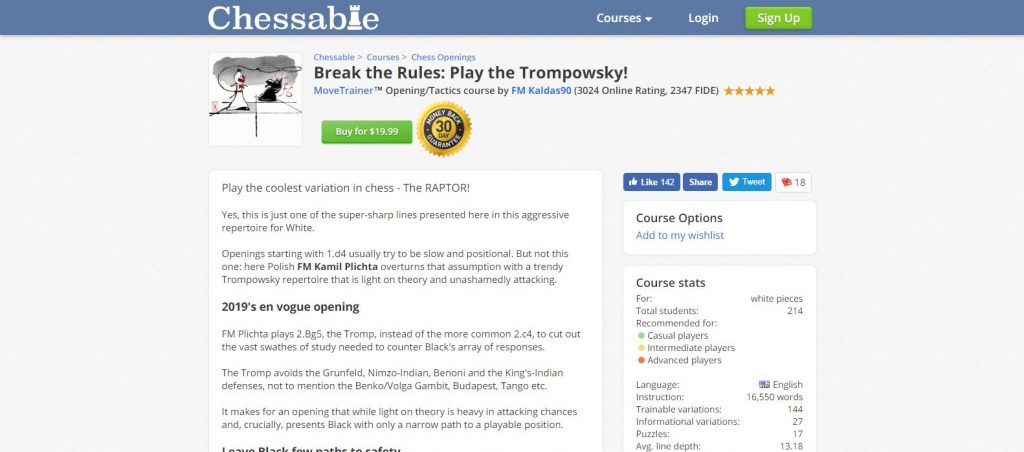
Q: There are other books about Trompowsky out there, for instance Winning With The Trompowsky by Peter Wells or Starting Out: The Trompowsky Attack by Richard Palliser Did you consult these books? What does your course offer that they don’t?
A: As I mentioned I got inspired by Richard Pert’s book. The other title that paid my close attention is Dmitry Kryakvin’s book from 2018 “Play the Trompowsky Attack”. Of course, when you create this type of online course you can’t allow yourself not to pay attention to both author’s suggestions. Still, I always had confidence in my own ideas and when I believed that it is better than 2600+ player’s invention I had no problem or fear of writing about that.
That is also the philosophy I had in my Chessable repertoire – write and create as many lines on my own and don’t copy other authors. Of course, sometimes it is impossible because one line is just good and there is no need to look for anything else, but most of the time I tried to create my own paths. 1.d4 Nf6 2.Bg5 Ne4 3.h4! is the core of my repertoire and I never saw any book that analyzed that line to any extent. I find these positions extremely fascinating for us and dangerous for Black.
Q: How did you decide on Chessable? Did you contact them or did they hire you?
A: I contacted them. I was doing opening files for more than 2.5 years + I was writing articles to polish chess magazine “MAT” so I decided that why not try to reach a bigger public. Also one of my goals for 2018 was to write a chess book, but when I realized how much time to income ratio will it involve I decided to be a little smarter and look for the other option. Personally, I find Chessable concept the nuts now and I spend a lot of time on my daily basis on training there.
Q: To be completely honest, I have tried going through their free introductory courses and I wasn’t thrilled – the fact that they show me the move and I have to repeat it was a bit annoying and slow – I felt that Chessbase or Lichess studies are more efficient to learn an opening.
Was I doing something wrong? How would you win stubborn and close-minded customers like me to give Chessable (and your course) a try? Am I the part of the target audience? If not – who is?
A: Let’s put it this way. Over a year ago I bought a book on Chessable about The Benko Gambit, written by IM Christof Sielecki. I did it mostly to see the files as I felt that Chessable’s idea of teaching me an opening by annoying repeating is not to my taste. To be perfectly honest, even when I published that book I considered that a mysterious fact that people really enjoy learning on that platform.
And then Portugal Open 2019 happened, where I had my shitty netbook + my phone and I had to repeat the whole Trompowsky. If you think that if somebody spends two months on writing the chess course then he knows everything, you have never been more wrong. I kept forgetting lines, confusing lines, confusing the right move orders etc. I knew something, but I wasn’t confident enough to play that over the board. And then I decided why not give Chessable a try. If so many people like that, then why not.
And I don’t write that now to convince you all to that site (at least let’s keep that as an official version xD). I write that from the perspective of someone who did 2 hours of repeating of his course and passed that with 97% accuracy. Since then I did around 7-8 “runs” through my course from the 1st line to the last keeping accuracy of 99% and making 3 mistakes from almost 700 moves for the last time. Before that, I would be delighted if I remember 90%. So yes, that annoying repeating is now greatly to my taste and I am preparing to learn all of my openings that way.
In my opinion, it is the most efficient, time-saving and structured way of learning an opening and that is not even close. You can see that I am quite active in my course and from 210 people that bought my book I am on 3rd place in learning leaderboard.
Q: Chessable course aside, you are also an active chess coach. You even mentioned becoming a full-time coach is one of your goals.
Although you have described it in your lichess profile, I would like to ask it here: How do you approach chess coaching? How do your training sessions look like?
A: It depends on what you want and what you expect. If you want to work on your opening, then it doesn’t differ from my normal work on openings, the only difference is that we discuss different concepts and you confirm or deny if something is right for you or not. Also if you take one lesson with me I will try my best, but I will not change you in 90 minutes. I will try to know as much as possible and try to find these weaknesses I talked about and give you ways to fight that and improve. Technically I use Discord as preferred software, but Skype is fine too. Most of the time Lichess Study, but for openings, Chessbase and only Chessbase showed to you by the screen sharing option.
Q: The topic of chess training and chess improvement is of particular interest to adult chess players. Although it is highly individual, what would you recommend to such a player wishing to improve? What should an ideal chess training routine consist of?
A: Everything depends on two things: your level and amount of time. If you can spend 30 minutes/day on chess then there is one option for you, to spend at least 3-4 of these days on doing tactics, as most of the games are decided by blunders. In The Woodpecker Method, authors Smith and Tikkanen wrote, that 42% of Grandmaster’s games are decided by a tactical mistake, while 1800-2000 level “achieves” 72% of games decided by a tactical mistake. We are talking about classical chess here, so you can imagine that number in rapid and blitz. You can also imagine how this number increases when the rating drops.
So if you have 4 hours of your time every week, you are rated 1550 and you spend 3 hours on how to play that line in the English Opening and 1 hour to play bullet and you repeat that scheme – then you just waste time. Don’t get me wrong! If you like that and that situation suits you – there is nothing wrong with enjoying chess that way. But if you ask about IMPROVEMENT, then it doesn’t have too much connected with that. And to be a better player you need to understand that tactics are the most important thing until you reach like 1800 FIDE. So constantly exercising your tactical vision will bring you the biggest boost of points and confidence.
I will give you an example. As I said I never did a serious and systematic training. I tried to force myself to do regular puzzles sessions, but it never worked. And then chess.com introduced Puzzle Rush. I loved that format since the first moment I saw that. Now I could train my tactical vision and enjoy that really much. On December 2018 Polish Blitz Championship was held. During the 3 weeks before that tournament, I solved around 43000 puzzles using that method (forty-three thousand in three weeks). I wrote that to confirm it was not a spelling error xD.
During that tournament, I felt like my tactics are sharp as never. I played a total amount of 28 games blundering a pawn + missing a tactic I wouldn’t be surprised to miss in longer time controls. The games I lost I was just outplayed, but the tactic was amazing. I took 2nd place Individually beating the Champion and also we took the 2nd place with my team Biały Król Wisznia Mała, where I scored 12/13. When I came home I increased my rating on chess.com from 2620 to 2779 in the next two months. A combination of learning the Tromp on Chessable connected with the work on tactics resulted in my best performances ever.
I am not telling you that to bout about how good I am, but I think that these kinds of things may really give you an answer about how to make a progress. I managed to find ways to improve while enjoying chess as much as I can.
Q: You also mentioned you work as an opening second of a few Polish Grandmasters. Is it a permanent job, or do they invite you before particular competitions?
A: I think we are missing my meaning of the “opening second”. I am not the kind of guy to go on tournaments with 2700+. I just created opening files which in my opinion are very good and sent them to a few of my friends who are GM’s. They decided that they are good enough to use them in serious classical games, so that boosted my confidence a lot and I knew that I am 100% ready to produce these kinds of work to the bigger public.
Now there are two people that get everything that I create, but both of them did something very nice for me in the past and this is just my gratitude for them. So if you imagined that I am Polish Peter Heine Nielsen then I have to sadden you xD The best reward for me is to look that something that I invented brought a point to 2600 player. That is an amazing feeling that can’t be replaced by anything else.
Q: Can you describe a typical day in the life of a chess second during a tournament?
A: Sit with Chessbomb open and refresh the page every 30 seconds xD.
Q: Do you feel you are learning something as a second. Or are you sort of a „click-bot“ working with particular input and trying to make an engine show a favorable evaluation?
A: I am giving away myself, but I feel that if I am really good in something related to chess, then I would definitely pick creating opening files. It hasn’t been even a month since I published my repertoire and some of my friends are already playing that. Today my friend sent me a game where he beat a 2300 player in 22 moves in the Czech league. 2 days ago Andrzej Krzywda wrote that he played the Tromp against 2500 player in a classical game and he was pushing the whole game without any moment where he was at risk of being worse. It is really pleasing to get money for something that really serves people.
Q: You are also quite active as a chess streamer. How is that going for you? Do you earn any money out of it?
A: No, never. I even don’t have an option of donation set in, or any kind of financial support. If you want to financially support me, then you can do something good for you – buy the Chessable course and kill people with the Tromp xD I like streaming, but I don’t have beautiful and colorful layouts. Even I don’t have any popups set to see if someone followed my channel.
I see that from time to time and then mention people who did that, but I mostly focus on playing and explaining (sometimes irritating). I don’t have a mod or Moobot, so if someone wants to come and write that this ugly bald FM should shovel shit instead of playing chess, then he has every right to do that. Of course, he will be banned, but at least he will be happy for that one moment xD
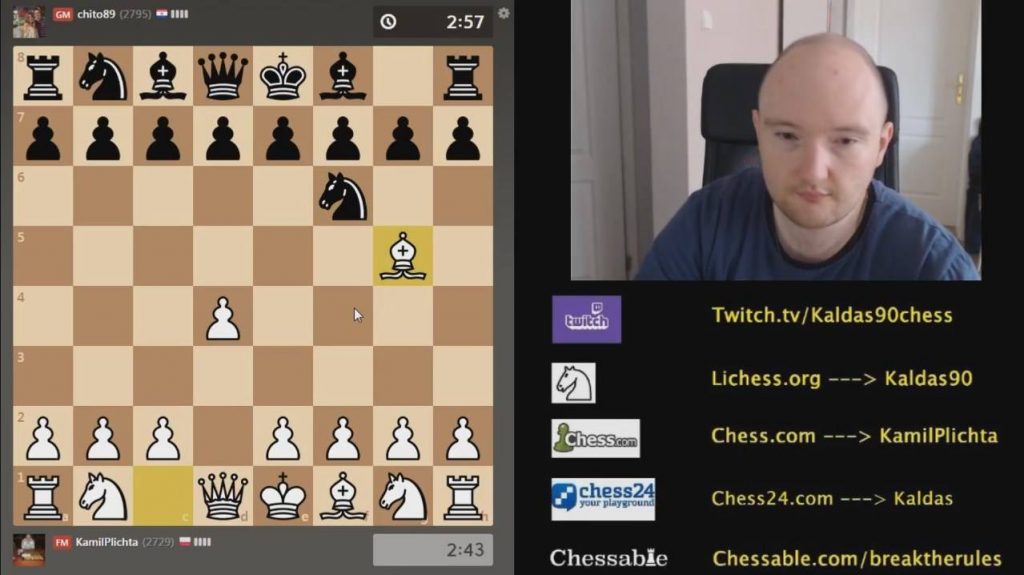
Q: How do you manage to combine all these activities? Do you ever feel you don’t have enough time to do everything?
A: No, I have time for everything. Lack of 23 days/8 hours job lets you do many things.
Q: Do you sometimes feel like „Jack of all trades, master of none?“. Do you ever feel like, say, giving up on streaming and devoting solely to coaching/seconding? 4
A: I am still looking for myself. I am 28 now and I am not sure what I will do in the next years. It is possible that I will devote myself to streaming, it is possible that coaching will be my choice, or maybe writing repertoires (most probably), but surely it will be something related to chess.
Q: Since I mentioned being „Jack of all trades, master of none“, in order to wrap the chess part of the interview, let’s get back to your playing career. How much do you work on chess nowadays? What does your training routine look like?
A: Same as usual – do what you enjoy doing at that moment. It never changed and probably never will, as the worst possible scenario for me is to treat chess as a job, not a passion.
Q: Ever since crossing the 2300 barrier, you have been consistently maintaining your rating over 2300. You have even crossed 2400 on one occasion and scored 1 IM norm. Yet, you haven’t managed to win the title. What do you think you are lacking to make another breakthrough?
A: I am lacking most probably pushing for the title. I want the title to come to me not the opposite. I feel like if instead of going to 9-10 tournaments with my family to enjoy time together I would go to 9-10 round robins, then I would manage to take that 2 norms from my opponents, but that is not the attitude that I have.
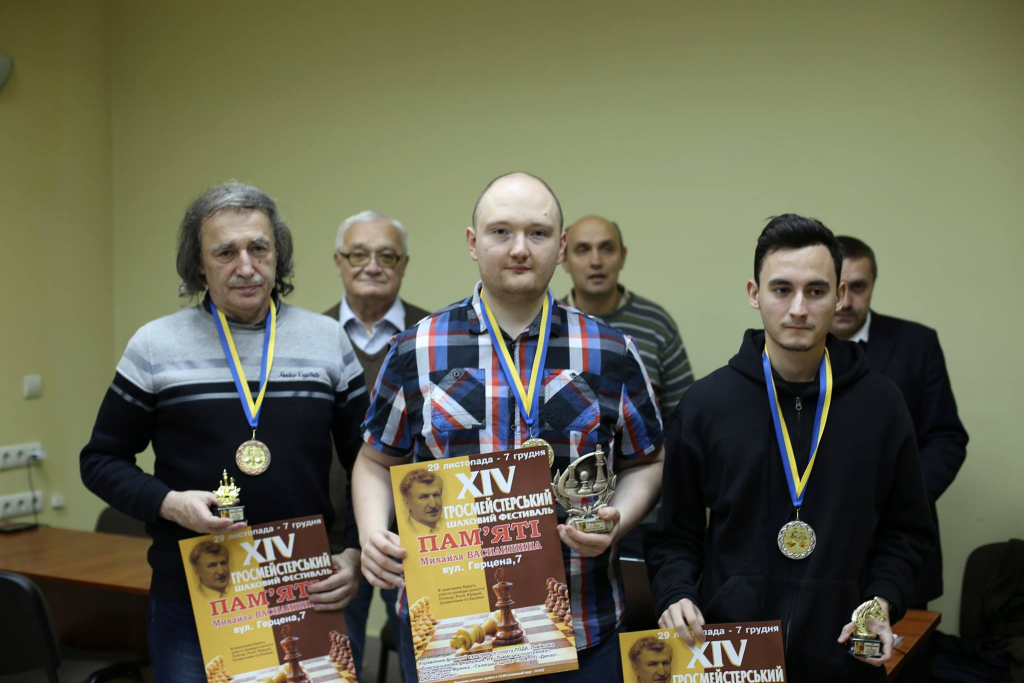
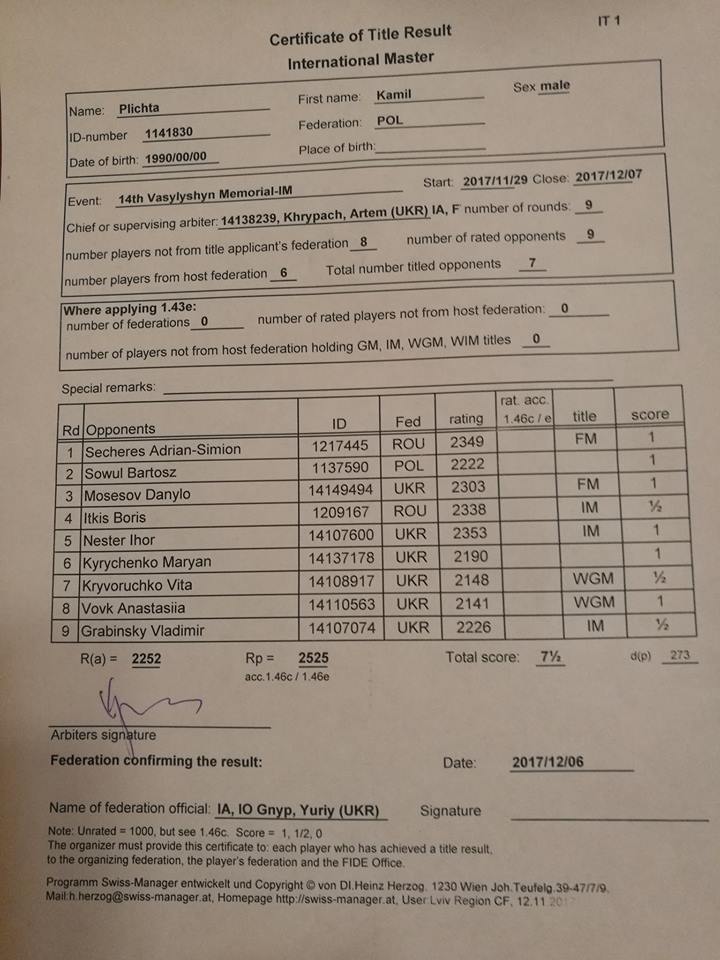
Q: Is getting the title one of your short term goals? Are there any others?
A: That’s an interesting question. Getting the title definitely not, but I would start being a little worried if I won’t be an IM to the end of, let’s say 2021. But as I said I have no push. I can double the number of tournaments that I will play in and then it should work, but I would need to stop doing all the other chess related things and I don’t want to do that. Short term goal is to write the 2nd part of my repertoire on Chessable which I recently started working on. It is going to be as sharp as the first part so I believe that it is going to be interesting for some people. Also, I would love to win the 2019 Polish Team Blitz Championship with my friends from Biały Król Wisznia Mała.
Q: What about long term goals? Do you have an ultimate chess dream? What is it?
A: Since I managed to beat Artemiev few times in blitz I feel like there are not many more “bosses” around. I would love to beat three players in blitz – Alexander Grischuk, Hikaru Nakamura and of course DR Nykterstein himself – Magnus Carlsen, but to beat them firstly I need a chance to play against them xD
Kamil Plichta off-the-board
Q: Last, but not least, the tradition of Chessentials interviews is to go beyond chess and talk about off-the-board matters.
First of all, we would like to congratulate you on your engagement. Can you tell us the name of the lucky girl?
A: Julia.
Q: I know this might be a tricky question, but – have you already determined a date?
A: Very tricky, since we are engaged since 6.06.2012 xD
Q: How do the weddings look like in Poland? In Croatia, there is a tradition toward inviting „the whole village“ – most ceremonies are attended by at least 100 people.
A: Normally yes, but we decided that instead of spending a fortune on one party it is better to maybe go to one hell of a honeymoon instead.
Q: Can you tell us how you two met? What was your pick-up line?
A: We met at the chess tournament in August 2008. In the beginning, there was no spark, but only after that, we knew that we belong to each other. About the pick-up line – you are asking the wrong person xD
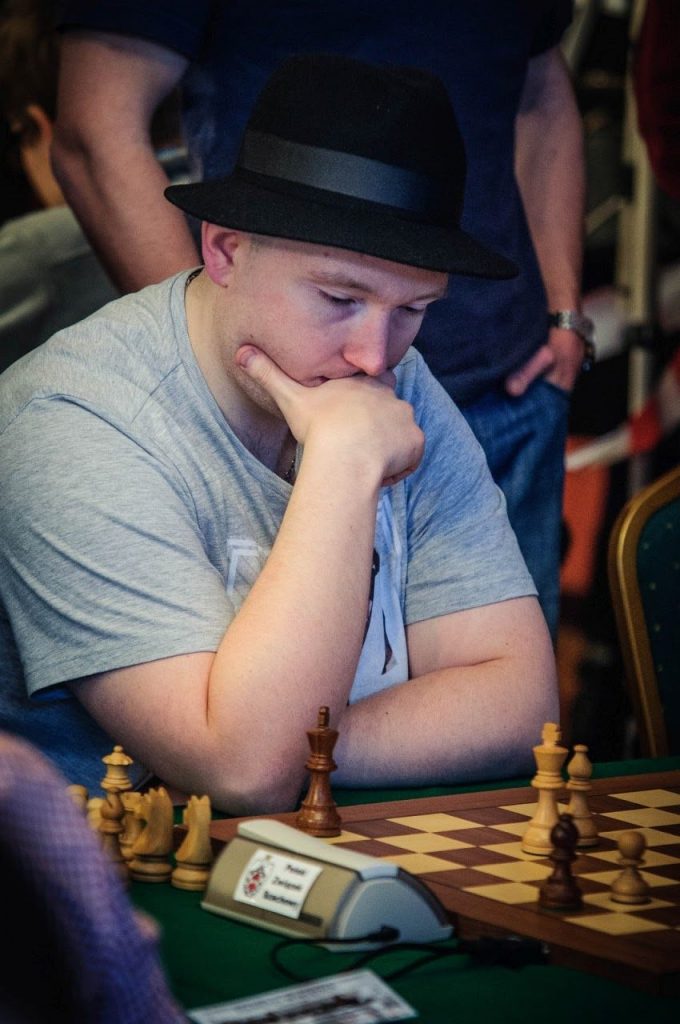
Q: Oh, so she is a chess player right? Does she play nowadays? Do you two travel to tournaments together?
A: Her last serious tournament was when we met xD Since then She travels with me to some of the events and she still loves the community. Sometimes she will play a game or two or even a small tournament, but most of the time chess is my thing.
Q: While we are at this topic – many chess couples I know consists of players with a marked rating difference (~300 rating points) in guy’s favor. Do you think being a high-rated player is more important for your „market value“ in the chess world than say, looks or charisma? 5
A: I wouldn’t care if I am outrated or not. I would start caring if my fiance would beat the shit out of me on the chessboard. Then I’d need to make some tricks like to glue Her king to e8 or something.

Q: Getting away from that, what else does Kamil Plichta do apart from chess and the Internet business. Do you have any other hobbies?
A: I kind of got addicted to Counter-Strike Global Offensive in 2017 and 2018 spending definitely too much time on that, but now I am more mature in that aspect. Instead of getting headshoted all the time I prefer to sometimes watch the best teams in the world play than playing myself, as I am a noob xD
Also, Kamil Plichta is on a constant diet and in eleven months managed to get from 119.7kg to 102. I love riding my bike so that definitely helps.
Q: Wow, it is a fantastic feat. Congratulations!
A lot of overweight people find it difficult to even start dealing with that problem. When and how did you decide you have had enough?
A: I had an agreement with myself that if I ever get to 120kg I have to chop my leg off. The vision of jumping on my one leg to the chessboard didn’t appear to me so a decision was made to move my ass and do something. When you have a sitting job you forget to control some stuff happening and now I can only look back and see how stupid my behavior connected with that was.
It was like, screw that I can lose weight whenever I want. I am happy that I managed to get shit together and work on my weight and I will keep doing that until I reach my ultimate goal which is to go to 85 and it is what a lot of the time will be devoted to this year. I also started thinking that 27 years old and 120kg is going to give me a heart attack in 10 years and I have some of the top players still to beat in blitz xD
Q: You said you were on a diet. What kind of diet? Can you describe your eating regiment?
A: I wake up rather late, between 12.00-14.00 and don’t eat for 3.5 hours. Then I eat a big dinner to really feel full. Normal food without excluding anything. Then for 4-5 hours, I am not hungry and after that, I take 2-3 small meals. I don’t have too many things that I excluded. I don’t eat sweets, but it was never a problem of mine anyway. I try to drink water only, but when attending a party or chess tournament then beer was also fine. I also like fruits and fresh juices, especially from carrots. I also like eating carrots. During summer I was drinking at least 3 liters of mineral water (at least 500mg/l+ of minerals – ideally around 2000mg/l ) every day
Q: Do you do also do any physical training? Any sport?
A: I was riding my bike a lot during the summer. It helped that in 2017 I bought myself a dream bike, which is very light and a pleasure to ride. I am living very close to the polish sea so it also “convinces” you to go out and do that sport. During winter it is much more lazy attitude to do anything, but between March and November, I plan to explore many new routes.
Q: Are you interested in sport in general? Do you watch/follow any sports?
A: Not really, I was Olympique Lyon fan, but it was mostly between 2006-2011 during the era of two great players – Juninho and Lisandro Lopez. Especially I liked the last guy who was a real warrior. I am a huge fan of high-quality chess streams. I always try to watch Hikaru Nakamura, Eric Hansen, Maxime Vachier-Lagrave and of course Magnus when he is streaming. I try to actively watch them and try to guess the moves. Sometimes I will watch a good game in a big CSGO tournament.
Q: Do you read any non-chess books? Which book can be found on your night bed as we speak?
A: 125 Opening Surprises by Graham Burgess – seriously xD
Q: What about TV shows and movies? Do you watch TV at all?
A: No TV series. I am the biggest fan of Breaking Bad, but besides that nothing. I like Tarantino and Monty Python productions. I have four actors that I really like – Clint Eastwood, Tom Hardy, Christian Bale and Woody Harrelson. If I needed to pick a few best movies that I watched then definitely (random move order)
– No country for old men
– Pulp Fiction – I bought myself the Bad Motherfucker wallet and it is the best thing I have ever spent my money on
– Shawshank Redemption
– Gladiator
– Lord of The Rings series – huge fan of Gimli’s character
– All Clint Eastwood’s westerns
Also, I am one of the biggest fans of the Coyote from cartoons.
Q: Your handle on various websites (Lichess included) is Kaldas90. What is its meaning?
A: Only polish people will understand. If anyone from outside Poland will figure that out I will have to kill him.
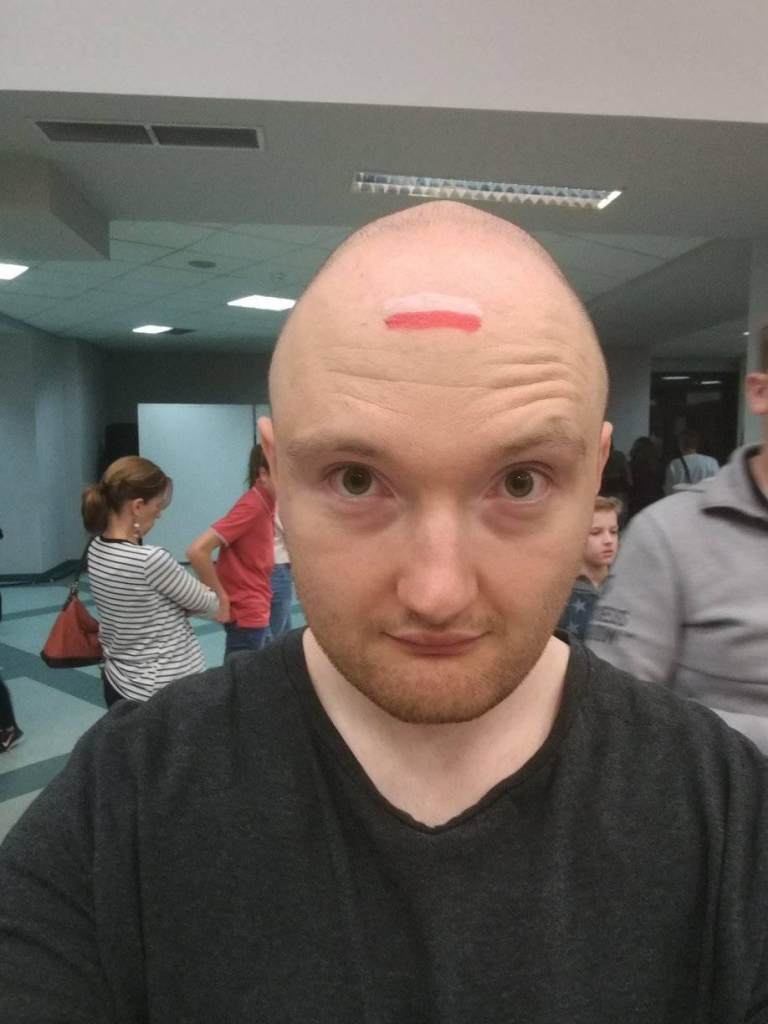
Q: If you could invite three persons to dinner, whom would you invite?
A: If I would reach the semi-final of the World Chess Championship then this is very easy – all of 3 remaining players and the food would be poisoned of course. The other option would be to go with Kramnik, Topalov and some surgeon to repair them after that meal, but seriously Alexander Grischuk and two people who are higher than me on my Chessable book’s leaderboard. If they really spent that amount of time they are crazy and I want to know them xD And Alexander, because he is my chess idol.
Q: Do you think chess players have typical shortcomings? Which ones?
A: I think non-chess players will answer that question in the best possible way.
Q: What is your life motto?
A: Better to regret what I have done that what I haven’t.
Q: Last, but not least, what would you say to a young person considering whether they should go to college? Do you have any message for potential college dropouts out there?
A: I want to have clean conscience. Let’s skip that question xD
Q: And to the rest of the readers? Do you have final words of advice for all the chess players out there? For adults wishing to improve their game? (Apart from hiring you as a coach :D)
A: Hire me as a coach. Try to honestly tell yourself what your improving possibilities are. The most important thing is to know how much time weakly do you have and what is your level.
a) small amount of time + smaller rating = more tactic puzzles
b) bigger amount of time + smaller rating = 50% tactics 20% openings 10% endgames 20% rest
c) small amount of time + bigger rating = 50% tactics 50% on your biggest weaknesses and biggest strengths
d) big amount of time + bigger rating = then it is much more complicated xD
Q: Okay, Kamil – thank you for your time and your answers! It has been a real pleasure to have you on Chessentials and we wish you all the best in your future tournaments. And more importantly – in marriage.
We hope you will manage to fulfill your wish and become a full-time chess coach.
Good luck in the future!
Links and resources where you can find out more about Kamil
Kamil’s Lichess Coaching profile
- It is easier to play better against a STRONGER opponent
- Kamil’s rating remained in the upper 2100s between 2010 and 2013 – VN
- To the readers – an FM title is reached when you pass 2300 Elo rating. You may check this article where I explain everything about the chess titles in greater detail.
- I ask this primarily because I often have these doubts in my own life – VN
- And you guys thought the questions in these interviews couldn’t get weirder. You are welcome :P – VN

